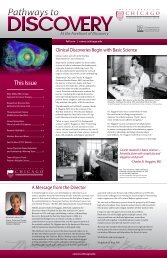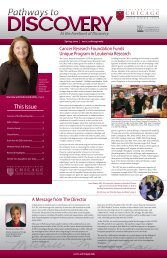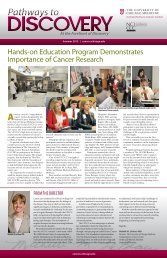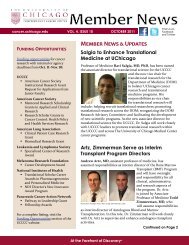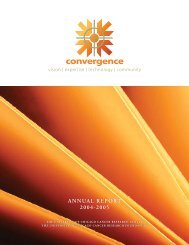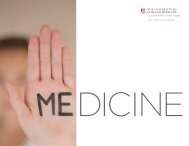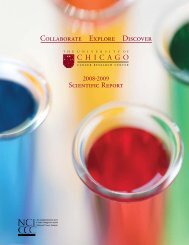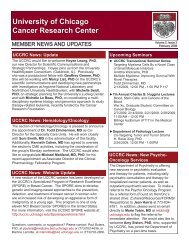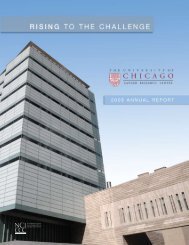ANNUAL REPORT 2003-2004 L REPORT Cancer Cures On All Fronts
ANNUAL REPORT 2003-2004 L REPORT Cancer Cures On All Fronts
ANNUAL REPORT 2003-2004 L REPORT Cancer Cures On All Fronts
You also want an ePaper? Increase the reach of your titles
YUMPU automatically turns print PDFs into web optimized ePapers that Google loves.
Our most vital concern, of course,<br />
is protecting the patient’s safety,<br />
privacy and health, and we are very<br />
careful to achieve the highest ethical standards<br />
in all of our trials. In fact, Dr. Christopher<br />
K. Daugherty’s research, which examines the<br />
ethics of clinical trials in advanced cancer<br />
care, is helping investigators maintain this<br />
principled focus. Dr. Daugherty’s studies<br />
analyze, in particular, doctor-patient<br />
communication, decision making, and<br />
issues of informed consent.<br />
Ensuring Patient Safety<br />
Research advances are making clinical trials safer and more beneficial for patients. Pharmacogenomics, for<br />
example, enables researchers to identify individuals who are most likely to suffer severe adverse reactions<br />
from the drug being tested. Our leadership in the study of cancer and genetics is an invaluable asset in<br />
ensuring effectiveness of our clinical trials and in protecting participants. Diet, environment, lifestyle and<br />
a myriad of other factors determine how individuals respond to cancer drugs, but genetics arguably is the<br />
most powerful factor of all. As a drug enters the body, it reacts with many different proteins, producing<br />
both therapeutic and harmful effects.<br />
Since genes determine the structure of each protein, minor disparities in a patient’s DNA can cause major<br />
differences in how his or her proteins react to a drug. That’s why a drug can be effective for one person and<br />
ineffective for another. It’s also the reason that a drug can be perfectly safe for 99 patients but extremely<br />
toxic for one.<br />
Understanding Patient Variability<br />
Mark J. Ratain, MD, has set the standard for studying and understanding human variability in responses<br />
to drugs. He chairs the Pharmacogenomics of Anticancer Agents Research Group (PAAR) study. This<br />
$14-million, four-year study is investigating how genetic differences affect an individual’s response to<br />
cancer drugs. The team begins with human tissue samples to evaluate the diverse ways our bodies absorb,<br />
distribute, break down and eliminate medications. The most promising compounds are then tested in<br />
human trials. The ultimate goal of Dr. Ratain’s research is to help tailor medicines to a person’s unique<br />
genetic make-up, which will ultimately make medicines safer and more effective for everyone.<br />
Dr. Ratain is also the lead investigator on a Phase II trial of a new drug called BAY 43-9006 that has<br />
demonstrated significant short-term benefits for patients with advanced kidney cancer. Less than 15<br />
percent of patients with metastatic kidney cancer respond to standard immunotherapy. In the trial, 42<br />
percent of patients had their tumors shrink at least 25 percent within the first 12 weeks.<br />
National Cooperation<br />
As chairman of the <strong>Cancer</strong> and Leukemia Group B (CALGB), Richard L. Schilsky, MD, oversees clinical<br />
trials that are delivering results that are equally spectacular. The CALGB is one of ten national clinical<br />
cooperative groups conducting Phase III clinical trials.



